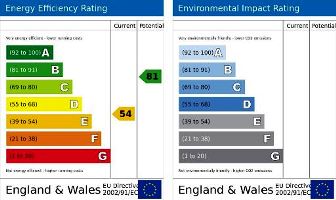An Energy Performance Certificate (EPC) rates a property's energy efficiency, costs, and emissions. Required for most sales, it lasts 10 years and offers improvement suggestions, with exemptions for specific properties.
An Energy Performance Certificate (EPC) provides an energy efficiency rating for leasehold and freehold business or residential premises. Typically, an EPC is included in the seller's pack, as it is a requirement when selling your business. For clarity regarding any exemptions, you can consult your local Trading Standards Officer
 An Energy Performance Certificate (EPC) is a crucial document that assesses how energy-efficient a building is. It offers insight into the expected costs for heating and lighting the property, alongside its carbon dioxide emissions. An EPC also provides practical recommendations to enhance the energy efficiency of the building.
An Energy Performance Certificate (EPC) is a crucial document that assesses how energy-efficient a building is. It offers insight into the expected costs for heating and lighting the property, alongside its carbon dioxide emissions. An EPC also provides practical recommendations to enhance the energy efficiency of the building.
EPCs utilize an A-to-G rating scale:
Each EPC remains valid for 10 years from its issue date.
Exemptions from EPC Requirements
Certain properties do not require an EPC. These include:
Demolition and Vacant Properties
A building is exempt from needing an EPC if it meets the following conditions:
Why You Need an EPC to Sell Commercial Property
By law, all commercial properties must have a valid EPC unless exempt. Failure to provide one can result in fines ranging from £500 to £5,000
Benefits of an EPC for Buyers
For buyers, an EPC offers a clear view of the property's energy efficiency. It helps them estimate heating and lighting costs, while suggesting upgrades to improve energy usage an attractive feature for long-term savings.
What Happens During an Assessment?
An accredited energy assessor will conduct a thorough evaluation of your property, examining:
Need an EPC? Nationwide Businesses Can Help!
Simply complete our application form, and our qualified energy assessors will handle the assessment process for you - from start to finish
Learn more, contact Nationwide Business Finance to find out the best options available for your needs.